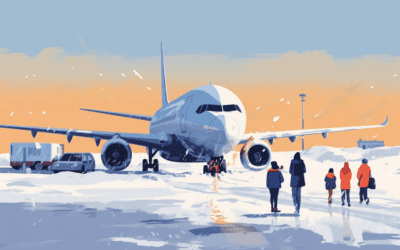Premium class and last-minute travel is expensive — and tax deductible for the rich traveling on business.
Most such travel is written off for hefty tax deductions. Business class and first class get written off together with such things as deluxe hotels, fancy restaurant meals and Super Bowl tickets. We all know that businesses write off their travel expenses; it’s been that way for years.
This isn’t about begrudging business travelers their travel perks for regular travel. Most cost-conscious travelers are used to the back of the bus. But since frequent flier programs started, the idea of saving miles for a special trip has been a dream for many. Now, with award miles based on money, that dream for travelers traveling only in coach will be increasingly unobtainable.
When these high ticket prices — justified by business reasons — also mean more free trips based on new dollar-based frequent flier programs, it is like the premium class, high-fliers are getting to get more personal vacation travel as well at the expense of those in coach.
Today, with changes to both Delta Air Lines and United Airlines’ frequent flier programs, taxpayers will also be subsidizing an increasing number of free vacation tickets for those premium travelers because of the airlines’ new frequent flier award formulas that focus on money spent vs. actual mileage.
The new frequent flier programs tie awards not to miles flown, but dollars spent. These new changes are far more significant even than the recent major increase in the number of miles needed to redeem free tickets, as they heavily impact bargain hunters and those who book economy tickets well in advance.
United Airlines is hoping they can fill planes with premium corporate travelers, whose tickets will be written off as a business expense either by companies with generous travel budgets, or with clients who will reimburse them. And, these premium travelers will be handsomely rewarded with miles for their own vacations.
Frequent flier status will still matter, but not as much as dollars spent. Here are a few examples to illustrate.
Today, for frequent fliers who travel 100,000 miles a year, a $450 economy-class roundtrip from San Francisco to JFK (2,586 miles each way), now earns more than 10,000 miles. After March 1, 2015, the same trip will earn only 4,950 miles. (For a flier without status, halve those numbers.)
Now, under the new rules, if that same traveler flies at the last minute, with a fare in the $1,200 range, they will earn about 13,000 miles. And, an elite flier with a last-minute trip — say, from San Francisco to Santa Barbara, 262 miles but costing more than $800 — will earn almost 10,000 miles. In the new frequent flier world money talks, mileage is muffled.
The rewards and differences get much larger with international tickets. In coach, a discount roundtrip San Francisco to London ticket, which currently earns up to 20,000 miles, will now earn half that, while an expensive business-class ticket could earn up to 75,000 miles.
Of course, there is no rule that expensive tickets can’t be purchased by individual travelers spending their own money. However, I don’t think that’s United’s marketing plan. In my experience, while I have individuals who are loyal and work hard to achieve status, clients who really spend a lot of their own money — if they don’t fly on private planes — generally choose flights based on convenience and are not focused on miles.
The temptation for business travelers to book more expensive tickets is going to be powerful, since someone else is paying. It’s one thing to save the company or a client money if it’s all the same to you. However, if corporate travelers can haul in double miles if they wait and book last-minute, the betting is that they will.
When tickets are written off as business expenses all of that cost doesn’t fall directly on taxpayers. However, the taxes saved by the rich and big corporations don’t go into the nation’s coffers. In a world of continuing budget deficits, the money has to be made up in some way. The general taxpayer eventually gets the bill for these big business deductions for which most citizens do not qualify.
Worse, the journeyman salesman forced to fly coach, with none of the premium class perks, will find themselves squeezed out of the frequent flier miles that used to make up for the hassles of frequent business travel.
The same will go for Americans who spend their own money, loyally sticking with one carrier in hopes of that dream vacation to Hawaii. Being rewarded for their loyalty will be only become harder while those traveling on subsidized tickets will get more freebies. Something seems out of whack.
[poll id=”16″]

